
Behind the Scenes at the Lab: What’s in the Works?
By Mel Poluck
Take a look at what the Lab has been working on over the last few months and what is coming up next.
This spring, since our last quarterly round-up, the whole team has been mainly focused on preparing and running our first major international event and developing two new core resources: the Digital Memory Database and Digital Memory Dialogues, as well as continuing our mission to realign the field of digital Holocaust memory studies and ensure Holocaust memory is sustainable in the digital age.
April
In the run-up to the 80th anniversary of the liberation of the last Nazi-run concentration camps, including Bergen-Belsen, we launched a social media campaign to showcase our nine official partners’ Holocaust memory digital projects. This culminated in the launch of our Digital Holocaust Memory Map, developed as part of the broader work we’re doing to develop a global, perpetual ‘living database-archive’ of digital Holocaust memory projects which seeks to collect historical and contemporary digital Holocaust memory practice. The platform will serve to :
- Allow practitioners in Holocaust museums, memorial sites, libraries and educational organisations to learn from each other’s experiences and save on ‘reinventing the wheel’ each time a new digital endeavour is started
- Give researchers access to not only a global range of digital Holocaust memory projects – many of which are onsite only and thus the field requires substantial fieldwork budgets even for scoping projects – but also to interviews with the practitioners involved in creating them, enabling a rich depth to analysis
- Enable creative and tech organisations embarking in this field for the first time the opportunity to learn about the ethical and practical considerations that may (and may not) be unique to Holocaust memory.
As part of our promise to ‘work in the open’, the database’s predecessor is this Digital Holocaust Memory Map, which “is an open-access resource seeking to capture digital Holocaust memory projects on a global scale, featuring more than 350 initiatives,” as Lab Research Fellow Dr Kate Marrison writes in the blog launching the map.
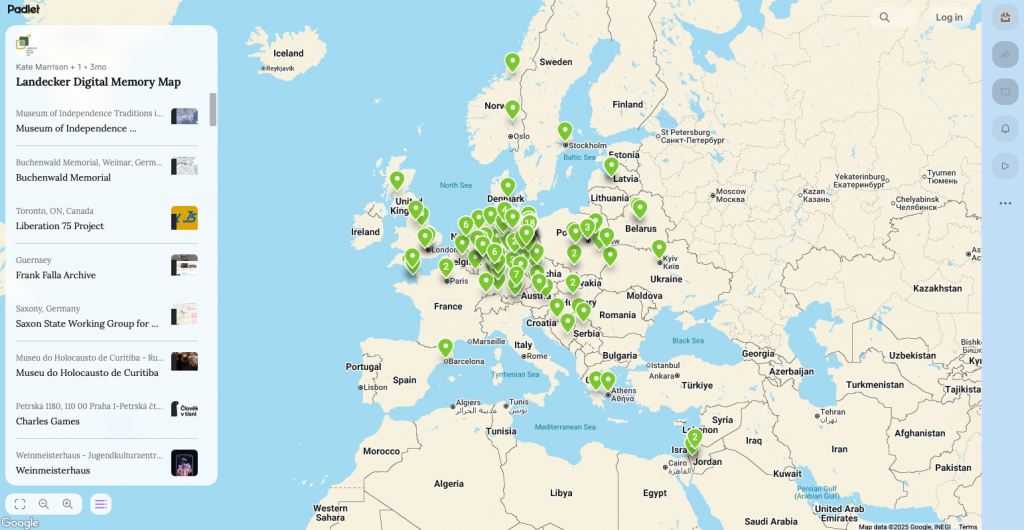
If you have digital initiatives at your organisation, please complete our survey – it takes about 20 minutes to complete and covers everything from digital strategy through to projects.
April also saw the publication of a working paper the Lab produced together with The Holocaust and the United Nations Outreach Programme. Read the report to see how funders and policymakers can better support digital Holocaust memory: ‘Sustainable Digital Futures for Holocaust Memory and Education: Recommendations for Funders and Policymakers’
The report presents findings from a workshop organised together with the Holocaust and the United Nations Outreach Programme at the University of Sussex held in June 2024, just days after the formation of the Lab team. It brought together representatives from major transnational and national bodies that support policy and funding for Holocaust memory and education, including digital Holocaust memory and education. Read more in the blog.
This month, also saw our research team present the ‘Digital Memory Database’ – our living database-archive – to a public audience for the first time in an alpha-testing session held with members of the Digital Memory Collective community, managed by our project collaborator iRights.Lab, Germany. Attendees ranged from Holocaust Studies academics, professionals working in Holocaust memory and education organisations, and digital creatives, representing five continents.
It has always been essential to the Lab that our flagship resource – the Database – be designed with users not just for them. Whilst the initial idea and design of the platform was developed through listening projects that preceded the Lab’s launch, this was the first opportunity to present work-in-progress to our core user groups. Amidst the detailed feedback of improvements we could make to better serve our community, there was also much excitement from attendees with several already recognising potential projects they could initiate with this resource, and one noting that: ‘this is a gift to us all’.
Amidst the detailed feedback of improvements we could make to better serve our community, one noted that: ‘this is a gift to us all’.
In the background, our Lab Director was also busy contributing evidence to the House of Lord’s Inquiry into Media Literacy through her role as an Executive Board Member of the UK’s Media Education Association. Dr Victoria Grace Richardson-Walden’s research into digital Holocaust memory continues to be applied to broader media education and literacies contexts.
Our Research Fellows also participated in fieldwork training, and the whole team finessed our indexing approach through peer-review and reflection.
May
It was peak preparation time for our Expo, but May was also when the first series of our innovative publishing platform Digital Memory Dialogues went live.
The aim of Dialogues is to “challenge traditional ideas of disciplinary silos and disrupt distinctions between ‘academic research’ and ‘research and development’ within and across the heritage, and creative and technical media industries, and higher education”. The format presents a provocation, followed by four responses and culminates in a live online discussions with the respondents and provocateur engaging with the wider public. Each respondent commits to peer-reviewing the other contributions in exchange for equal peer-review from their fellows. Importantly, unlike most academic journal formats, all contributors are paid for their contributions.
The theme of Dialogue I was ‘Can the Holocaust be playable in computer games?’ Computer games were seemingly the last taboo of Holocaust representation, yet recent years has seen an increased interest in the medium, even by Holocaust museums and memorial sites. The Dialogue explored whether game designers and heritage organisations have fully explored the potential of this medium for Holocaust memory and it culminated in a live discussion, which for the launch was a special hybrid event with an in-person session at the Expo (in June) which was live streamed. You can watch the session on the Dialogues site here.
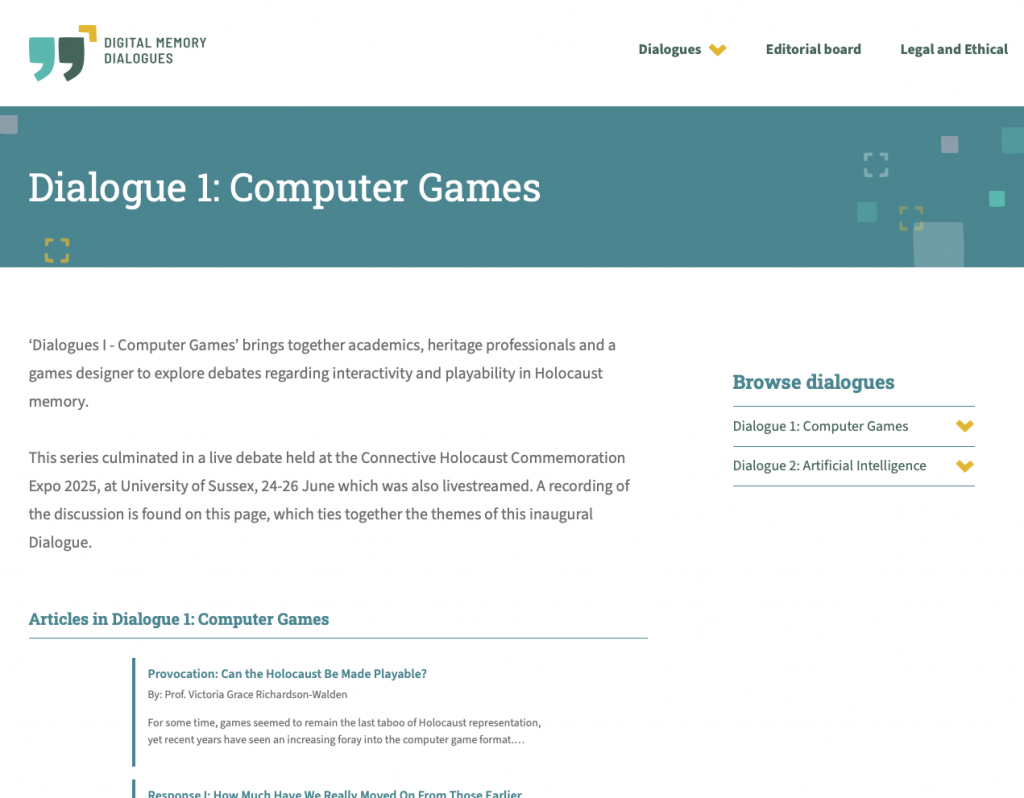
Dialogue II launches this autumn and focuses on AI and Holocaust memory, with a provocation co-written by our last year’s visiting fellows Dr Mykola Makhortykh and Maryna Sydrova.
If you are interested in proposing a theme and acting as guest editor for a future Dialogue, please get in touch.
The month continued with two important speaking opportunities for our Lab Director:
Firstly, she contributed as a discussant at the event A Conference in Memory of Prof. Yehuda Bauer: Holocaust Memory in the Age of Artificial Intelligence, hosted by the Van-Gelder Center for Holocaust Instruction and Research Faculty of Education, Bar Ilan University and The International Institute for Holocaust Education, Yad Vashem.
Here, she stated that whilst Holocaust memory is being shaped by a new ‘algorithmic turn’ (Makhortykh 2022-26), there is an urgency to stop and ask ourselves: why do we want to adopt AI? What actually are AI models, and what are they good for? And what are the opportunities and consequences of bringing these models into Holocaust memory practice?
She presented listeners with a brief introduction to the logics underpinning popular AI models, before offering a series of questions to help frame decision-making in adopting them for Holocaust memory purposes:
- What pedagogical or commemorative aims are we trying to achieve?
- Why are we thinking about using ‘AI’ to do this?
- What assumptions about ‘AI’ is this based on?
- What actual mathematical logics are useful in this case, and therefore what model(s) would help us? Do they exist, do they need building?
- Is any form of ‘AI’ actually the right tool for the job?
Later in the month, she continued on this theme as an invited speaker at AI and the Future of Holocaust Research and Memory (a closed workshop followed by a public colloquium) organised by the University of Washington, UCLA, and the Jack, Joseph and Morton Mandel Center for Advanced Holocaust Studies, United Studies Holocaust Memorial Museum, held in Seattle. She was asked to respond particularly to issues related to AI, representation and reception and re-emphasised thoughts raised more briefly at the previous discussion focusing on the distinction between ‘representationalism’ and ‘mathesis’ as different ways of organising the world around us to make it knowable and understandable.
She argued that we need to adopt a new language to talk about the content generated by AI models that shifts our discourse away from representationalism towards mathesis, introducing the concept of ‘lexicon diffusion’ to replace ‘images’ when talking about Gen-AI systems like MidJourney’s (seemingly) visual outputs. She asked: what can mathesis ways of organising the world do for Holocaust memory?
June
This month can be mostly summarised in two words: The Expo.
However, before our first major international event, our Lab Director was in Amsterdam for the Kick-Off of the European Memory Data Space Project – an ambitious scheme to bring together stakeholders engaged in Holocaust remembrance across Europe with data space specialists to collaboratively develop the first blueprint for a European Memory Data Space. Here, she was invited to give two presentations as one of a series of ‘Visionary Speakers’, firstly on sustainable approaches to digital Holocaust memory, and secondly on AI. The presentations of all Visionary Speakers can be viewed here alongside a summary of the event.
Then, after many months of planning, we finally welcomed almost 180 participants to the University of Sussex for the three-day Connective Holocaust Commemoration Expo 2025. Delegates come from more than 30 countries to learn, share, play, connect and co-create ‘digital Holocaust memory futures’ together.
Academics, creative technologists, social and computer scientists, VR designers, games designers, educators, Holocaust memorial sites, filmmakers, museum and heritage professionals and others shared their research, ideas and practice through talks, workshops, exhibitions, a VR suite, games arcade, exhibitor hall, ‘let’s play’ sessions, networking lunches, and panel discussions in a dynamic, international environment.
“It was a fantastic event – a huge organisational feat, and a very important event to have at Sussex.” – Professor Sasha Roseneil, Vice-Chancellor and President of University of Sussex
We’re extremely grateful to everyone who made it possible: each individual, organisation, all of our project partners and collaborators, and especially our funders the Alfred Landecker Foundation.
We were bowled over by the positive feedback we received: better still, the feedback aligned with our aims for the Expo, to create an opportunity to get together with colleagues, contacts and counterparts from across the world – transcending borders, disciplines and fields of knowledge – to learn and collaborate on the present and future of digital Holocaust memory initiatives.
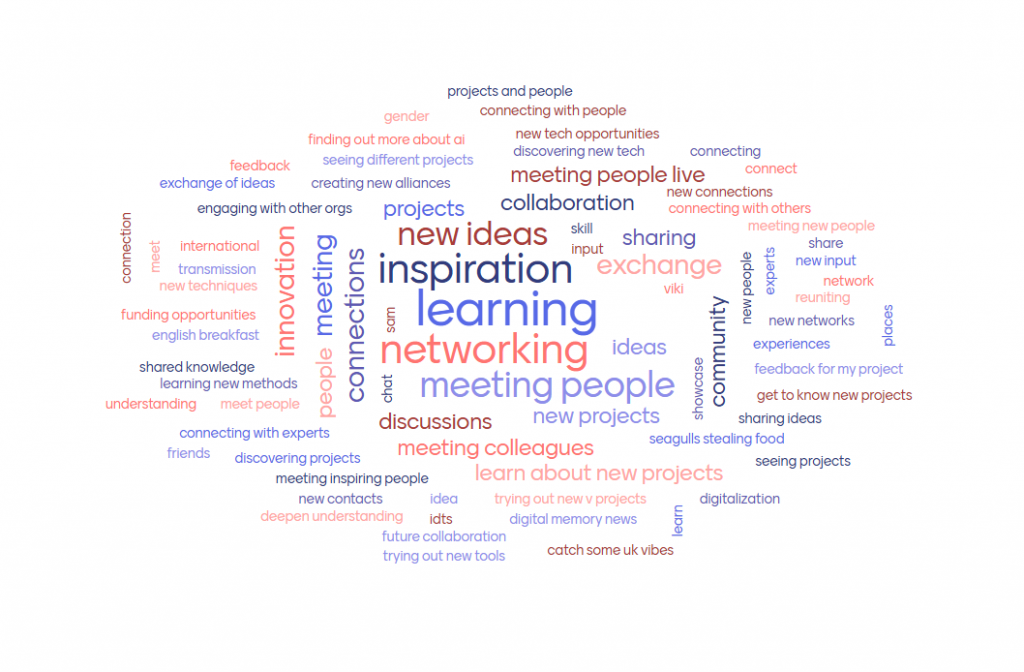
Wordcloud formed by feedback from Expo delegates, in answer to the question: ‘What are you most looking forward to at the event?’
You can read a detailed review of the whole event here on our blog. And if you were not there, the University of Osnabruck did an amazing job of capturing the many Expo spaces in 360 degrees as part of their ‘Dispatches’ series on our event (read part 1, part 2 and part 3 for the 360-degree tour).
Among the incredibly varied and enlightening sessions, proud highlights for us were beta-launching our Digital Memory Database (due to publicly launch early next year), the roundtable discussion officially launching Digital Memory Dialogues, and our first mini-hack event which brought local and international tech and creative professionals with Holocaust memory and education experts to ‘hack’ three projects – from Germany, the UK, and Brazil, working through ethical, technical and practical challenges.
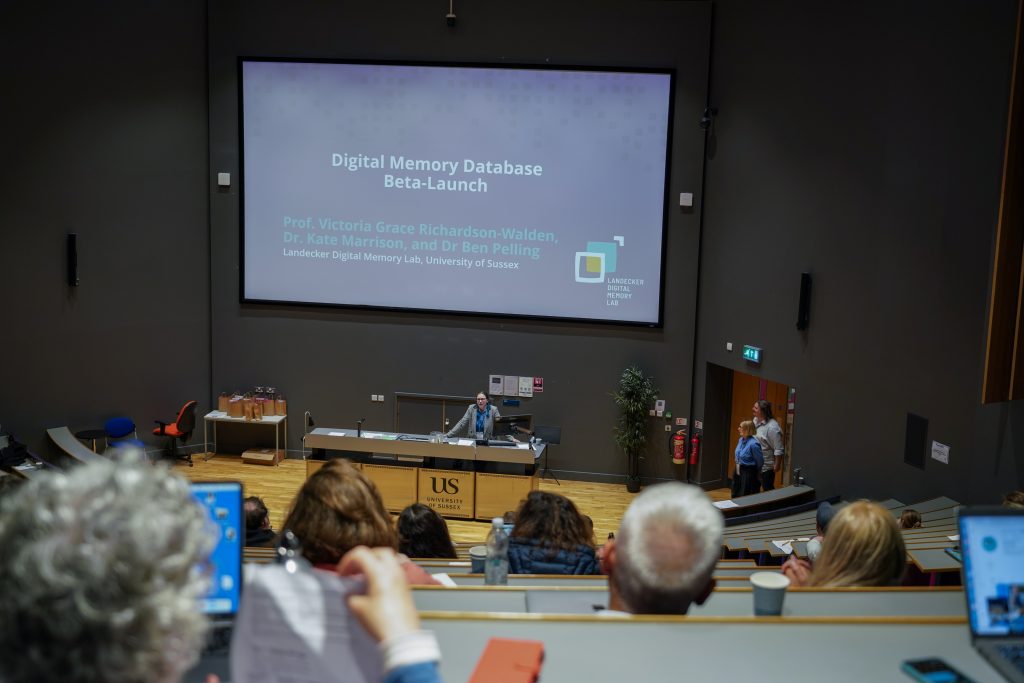
Read the press release from the event here.
All sessions, except networking lunches and hands-on workshops, were recorded and will be available on our website in the coming months.
July
No sooner had we packed up the Expo, planning for the next one began and just days later, the Lab’s research team jumped straight into the Max and Hilde Kochmann Summer School for PhD Students in European-Jewish History and Culture on our home turf of the University of Sussex.
Hosted by our colleagues by the Sussex Weidenfeld Institute of Jewish Studies in cooperation with the Center for Jewish Studies of the University of Graz and the European Association of Israel Studies, it brings together early career researchers working on topics in Jewish history and culture, Israel Studies and digital humanities, giving them the opportunity to present and discuss their projects in an informal and friendly atmosphere with leading scholars.
During the summer school, some of the students gave up their time to user test our Digital Memory Database, and this has continued apace ever since with our research team touring it at a number of conferences over the summer months. This feedback is absolutely essential to the design of the database and will inform the next development cycle, building on our alpha-testing in April.
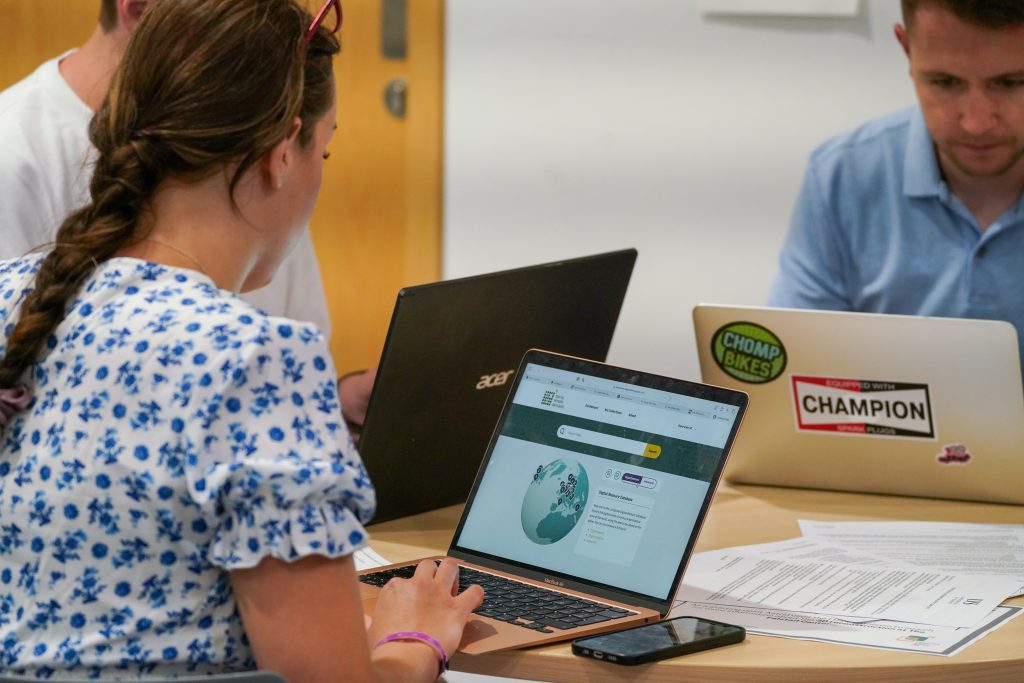
Read more about the development of the platform in this three-part blog series focused on three distinct aspects of its progress: mapping the digital memoryscape, gathering and preparing content, and software development.
Straight from the Summer School, the Landecker Digital Memory Lab research team attended the British and Irish Association of Holocaust Studies‘ annual conference in Kent, UK, and hosted another database user testing workshop there. Lab Director Prof. Victoria Grace Richardson-Walden also delivered a keynote ‘Digital Holocaust Memory – 30 Years On’ and is now looking forward to her new role as President-Elect of the Association, commencing in August.
Dr Richardson-Walden then travelled straight to the AGM of The Media Education Association (MEA), where she was voted in as Co-Chair. Of her new role she says: “The Lab believes that ownership of improving media education at a national level can only help support work to ensure people are able to recognise mis- and disinformation about the Holocaust online”.
Three days later, she had the pleasure of visiting the Holocaust Educational Trust in London, where she provided a training session for their team of educational officers on AI and Holocaust education. Such bespoke training sessions can be offered as part of our free consultancy/advisory service, so please do get in touch if your team would benefit from workshops, advise, or intermediary support.
In less than a week, the whole research team was off again, this time to Prague to attend the Memory Studies Association’s annual meeting – a major, global gathering of memory studies researchers with 1400 delegates and 300 sessions, with circa 80 countries represented. There, the Lab team:
- Held another beta-testing session of our database.
- Contributed to a roundtable ‘Museums and Contemporary Memory Politics in Precarious Times’ hosted by the Museums and Memory Working Group which our Lab Director co-founded. The session asked ‘how can museums under the duress of government influence avoid becoming simply instrumental tools for the values and policies of a particular government?’ and ‘serve as places of critical dialogue in difficult times?’
- Ran the workshop ‘Playing with Memory in Prague: Holocaust Computer Games’: a live play session and group discussion exploring Holocaust -related games produced by Prague-based studio Charles Games.
- Contributed to two panels focused on AI’s role in Memory Studies:
- ‘New Directions and Challenges in Memory Studies: Environmental Crises and the Rise of AI’: a talk about the future of memory studies in light of both the ‘fourth wave’ concerned with the Anthropocene, and the field’s recent interest in AI.
- ‘Handling the Hype: Demystifying AI for Memory Studies’, discussing a collaborative work-in-progress focused on how we should handle ‘AI’ in memory studies work, inviting participants to consider ethical methodologies and approaches.
Between inspiring, collaborative meetings, keynotes, exhibitions and panels, the Lab research team went on scoping excursions to Lidice Memorial and the newly opened Memorial to the Holocaust of the Roma and Sinti in Bohemia at Lety u Písku. The team was particularly grateful for meeting old contacts and making news ones during the event. Look out for our forthcoming blog from the team on their reflections of the conference.
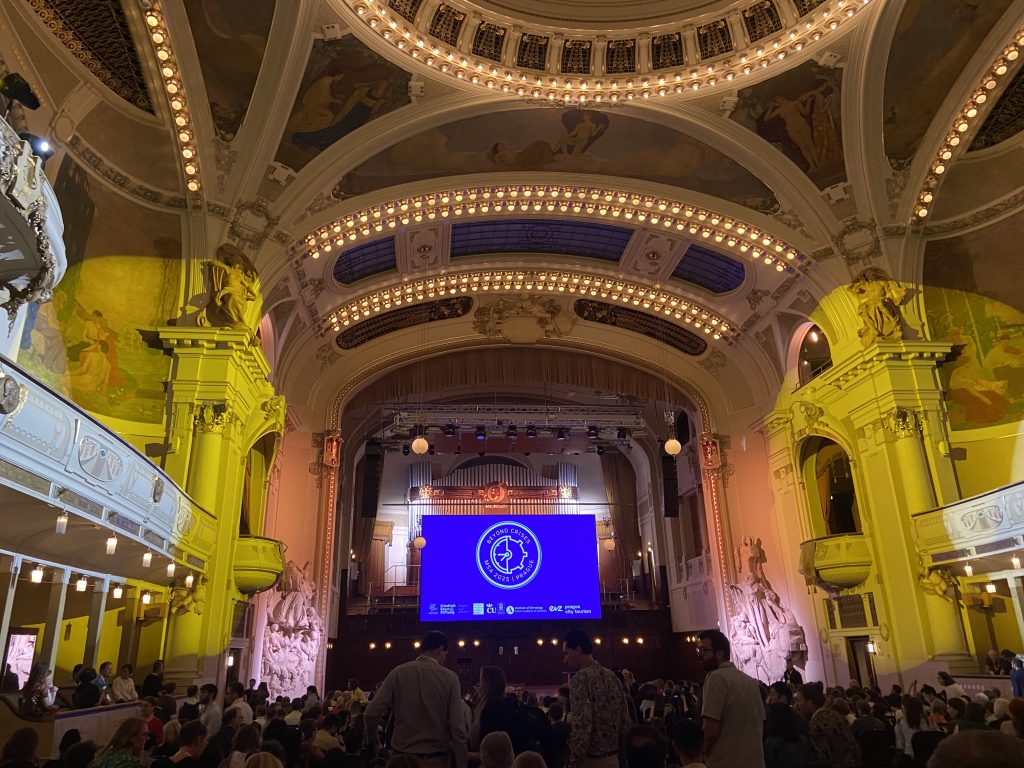
Coming soon
In the next few months, the team will be working hard to get the Digital Memory Database publicly launched, releasing Dialogues II, welcoming a visiting fellow, and continuing to develop world-leading research and interventions in practice.
We will keep you updated through our social media posts and blogs. Look out for our first public annual report coming soon too.
You can also stay in contact or ask us questions about our work using the contact forms on the website and you can follow our work on social media at Facebook, LinkedIn, Bluesky and Instagram.
Want to know more?
Behind the Scenes at the Lab: What’s in the Works? (Winter 2025) – Landecker Digital Memory Lab